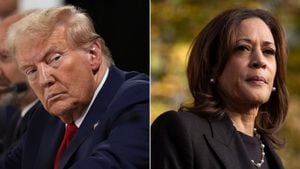Donald Trump's return to the presidency after the 2024 election has sparked renewed conversations across the political spectrum, with both supporters and opponents adjusting to the implications of his re-election. Mayor Eric Adams of New York City faces unique challenges as he navigates the political waters under Trump’s administration. On one hand, he could benefit from the sympathy Trump expressed toward his current legal troubles. Trump, who hinted at possible political retaliation from the Justice Department against Adams for his stances on immigration, has oddly become a potential ally for Adams, who is currently fighting federal corruption charges himself.
During one of Adams' press conferences, he struck a conciliatory tone as he expressed his willingness to collaborate with the incoming administration, aiming to protect the interests of diverse groups including women, immigrants, and LGBTQ+ individuals. "We will work with the new administration and Congress to develop a realistic and compassionate national strategy for our immigration system," Adams stated. Despite this diplomatic maneuvering, he has cautiously avoided answering questions about whether Trump’s election might influence his own legal predicament.
On the national front, Trump supporters, including prominent foreign leaders like Narendra Modi and Vladimir Putin, have celebrated his victory, viewing it as vindication for their right-wing ideologies. Trump’s presidency is seen by these leaders as possibly revitalizing and empowering far-right movements worldwide. Nigel Farage, the leader of the Reform Party, emerges as one of the biggest beneficiaries of Trump’s win, considering it to be potentially restoring relevance to his own political aspirations amid challenges faced by the British Labour Party.
Yet, not everyone is basking in the glow of Trump's re-election. Across the Atlantic, the mood within some left-leaning circles is somber. Katherine Viner, editor-in-chief of The Guardian, offered counseling to her staff who felt distressed by the election results, labeling Trump’s win as “upsetting” for many colleagues. Viner encouraged her UK and Australian teams to reach out to their US counterparts as she recognized the emotional toll of the election’s outcome. She even invoked the need for strong independent journalism to resist Trump’s influence, likening this moment to urgent calls for support amid adverse political climates.
Back stateside, analysts are already weighing the potential economic impacts of Trump’s victory. Investment experts are positing benefits for the oil sector, especially concerning the environment of regulatory reform anticipated from Trump's return to power. Local business leaders, such as Midland's Mickey Cargile, expressed optimism, projecting the continuation of tax cuts established during Trump’s first term, which could lead to reinvestment and economic growth within communities like the Permian Basin. Cargile asserted, "The expectation is the new president will want to continue those tax cuts... which will give us more money to reinvest."
The ramifications of Trump's return stretch beyond local economies and political alliances; they set the stage for significant shifts on global issues. Environmentalists brace for what many anticipate will be anti-climate policies as Trump is expected to retract the US's commitments to reducing carbon emissions. Notably, Trump has pledged to prioritize fossil fuel extraction, potentially dismantling efforts built during the prior administration. Protest against these choices looms large as advocacy groups prepare to mobilize for what they predict will be aggressive assaults on environmental regulations.
The re-entrance of Trump prompts important reflections on America’s political dynamics. The tension between admiration and critique of Trump is palpable within his party; as he consolidates power, discussions arise on what the future holds for the Republican Party. Historically, figures like Boris Johnson have found common ground with Trump, pushing forward right-wing agendas which aim to reshape party lines and the electorate’s expectations.
Even among voters, motivation behind their choices reflects deep societal fractures. Many Trump supporters, feeling neglected by traditional political structures, view his presidency as their answer to long-standing economic anxieties and immigration fears. Conversely, advocates for social equity stress the dangers of his policies, indicating grave potential setbacks for civil rights achieved over decades. Their voices resonate particularly loudly amid fears of normalization of aggressive far-right rhetoric.
There lies undeniable complexity and uncertainty about Trump’s next chapter. Important questions arise, such as the fate of marginalized communities under his governance, and the very fabric of democratic norms as we know them. With future midterm elections also looming, indications point toward both possibility and polarization as this new political epoch begins. For New Yorkers like Eric Adams, the weight of public confidence rests heavily on their response to the whims of powerful political giants like Trump.
So what does this all mean for Americans? The interplay of economic opportunity, political maneuvers, social justice, and global interactions will shape not only the immediate response to Trump but also the roadmap for society over the coming years. Adams’ precarious position serves as a microcosm of the larger dynamics at play, highlighting the balancing act required to lead amid fierce crosswinds of political allegiance and personal integrity. How these political landscapes shift could redefine the political tenor of the United States for generations.



